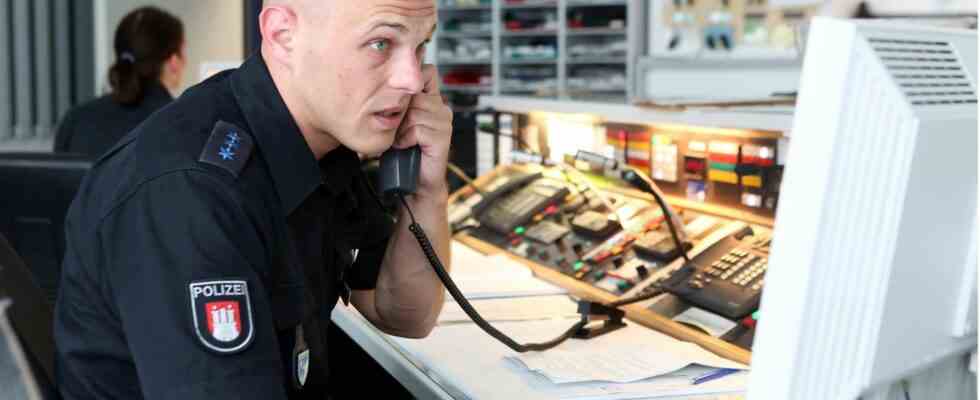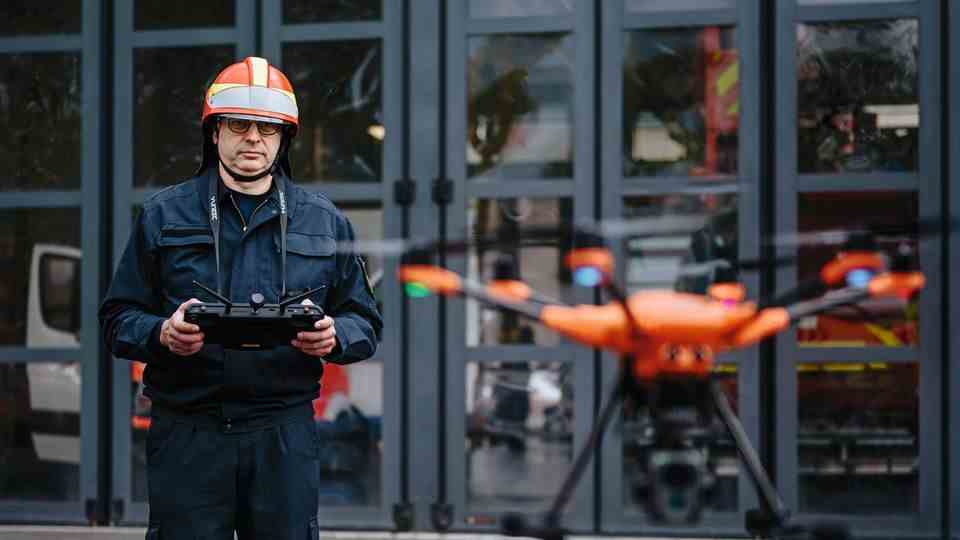No connection on 110 and 112
“Nora”, registration offices, alarm plans – that’s what happens when the emergency call is no longer available
Policeman in the control center of the Hamburg Davidwache (archive picture). Due to a defect in the Telefónica network, the emergency numbers 110 and 112 were unavailable to many people for several hours on Thursday.
© Bodo Marks / DPA / Picture Alliance
The failure of the emergency numbers for the police and fire brigade can have dramatic effects. What happens to the authorities when 110 and 112 no longer work – and how you can still call for help in such a case.
They are nightmare scenarios: an apartment fire, a traffic accident or a robbery – and neither the police nor the fire brigade can be reached because the emergency call has failed. The 112 and the 110 – dead. And then?
The failure of the emergency numbers or the telephone network presents the emergency services with challenges. The disruption at the network operator Telefónica on Thursday made this clear once again. In several federal states, the authorities reported problems with the accessibility of the police and fire brigade control centers. Hamburg and Bremen in particular seemed to be affected (the star reported).
Ultimately, it turned out that there was no error in the emergency call, but the network of Telefónica, the O2 parent company, was disrupted – but for those seeking help it makes no difference why he or she cannot get through to the emergency call.
Fire in Berlin
Robots, water cannons, tanks: material battle at Grunewald
The police and fire brigades throughout Germany have plans in the drawers for disruptions to emergency calls or the telephone network. They should ensure that help can be provided quickly despite the failure of the emergency numbers.
The population must be informed of the emergency call failure
The fact that the telephone network or the emergency numbers are down must first be announced so that the citizens know. This happens, among other things, via the social media channels of the police and fire brigade, but also of city administrations. In addition, information about the disruption is also provided via the media, for example via announcements on the radio. Warning apps for smartphones are also playing an increasingly important role. Information about “Nina” and “Katwarn” was distributed on Thursday. These reports come directly from the situation centers of the respective federal states. If possible, information is also given about alternatives to alerting the rescue services – police stations, for example, can often still be reached via their usual landline numbers.
On Thursday, the authorities in Bremen and Hamburg also referred to the telephone number 19222, on which the control center for patient transport can normally be reached. The connections were manned by the police officers and should only be manned “in absolute emergencies” due to the lower capacity, according to the Hamburg police.
At the same time, if 110 cannot be reached, the presence of officers on the street will be increased – “massively”, as the police in Germany’s second largest city emphasized on Thursday. According to the “Hamburger Abendblatt”, “all available forces from the criminal and security police” have meanwhile been alerted – because no one knows in advance how long a disruption in the telephone network will last.
Reporting points in Bremen, increased police presence in Hamburg
“If necessary, please contact a patrol car or go to a guard,” the Hamburg police called on the citizens of the Hanseatic city. Fires or medical emergencies should also be reported to the patrol car crews in such situations, said a spokesman for the Hamburg fire department. In addition, the fire and rescue stations in the city area were staffed at all times and also received alarms personally. As a precaution, the fire brigade itself does not send any vehicles on patrol, a spokesman for the Hamburg professional fire brigade explained star.

The authorities in Bremen went one step further. Additional reporting points for emergencies were set up on the Weser, including at the central Sielwall junction or at the Vegesack bus station. The guards of the volunteer fire brigades were also manned. The emergency departments of the Bremen hospitals also received alarms personally. The authorities in the Hanseatic city published a map with all points of contact for emergencies. “It was a difficult situation for us,” said a fire department spokesman on Friday starAfter all, the reason for the unreliable availability of the operations center for the citizens was unclear for a long time. A crisis team was therefore set up. “Communication with our emergency services was possible at any time,” emphasized the spokesman.
Emergency calls also possible via apps
In some other municipalities, the alarm plans also provide for the rescue services to patrol the streets and be available as contact persons.
If only a specific mobile network is affected by a fault, the authorities advise using a friend’s or neighbor’s cell phone to make the emergency call via another network.
In addition, smartphone apps for alerting the police and fire brigade could play a greater role in the future. With “Nora”, the official emergency call app of the federal states, it is already possible to inform the helpers about an emergency – at least as long as the (mobile) internet is not down. Originally developed for people with speech or hearing impairments, the program is now available to all users in the Apple App Store and in the Google Play Store available for free. The emergency calls that can be made via chat, for example, go “directly to the responsible police, fire brigade and rescue service control centers”, even the current location can be transmitted automatically. A “silent emergency call” for “threatening situations” is also possible, according to the responsible Ministry of the Interior of North Rhine-Westphalia.
The Hamburg interior authorities are preparing for the fact that emergency calls via other channels than the telephone will become more important. The new building for the police and fire brigade control centers to be built by 2025 is already designed for this: “Emergency calls can then no longer only be made by telephone, but also via smartphone-based apps or messenger services,” said the statement at the laying of the foundation stone this week. “In the future it will also be possible to transmit image and video files in real time. Possible difficulties in locating those seeking help can also be overcome using digital location transmission.”
Police union calls for investment
A spokesman for the Bremen fire brigade explained to Radio Bremen a year ago after the failure of the emergency call a year ago that all systems in the control centers and at the network providers are designed redundantly in terms of reliability.
The disruption in the Telefónica network on Thursday was resolved around 11 p.m., and the emergency call centers should also have been available again from all connections afterwards. The company announced that a “voice server” had failed. Since the redundancy was obviously not fail-safe, the police union (GdP) called for more investment in a more reliable technical infrastructure and replacement systems. “If I can’t make an emergency call for hours, it’s dangerous,” said GdP federal chairman Jochen Kopelke. The question arises as to the quality of the telecommunications companies’ contingency plans and whether they have been subjected to a sufficient examination by the Federal Network Agency, Kopelke explained.
After all: The nightmare scenario of no help for people in need or much too late has apparently not materialized in Hamburg and Bremen. The spokesman for the Hamburg fire brigade said he was “not aware” that someone was injured due to the poor accessibility of the operations center star. In Bremen, too, the fire brigade assumes that it has not missed any missions. The volume of emergency calls was similar to that on “comparable days”, said the Bremen spokesman and drew a preliminary conclusion of the exceptional situation: “We managed to deal with the crisis completely.”
Sources: Hamburg police, Hamburg Fire Department, Bremen fire brigade, Kerpen fire brigade, “Hamburger Abendblatt”, Emergency call app “Nora”, Interior Authority Hamburg, Radio Bremen, Telefonica, Police UnionDPA news agency



